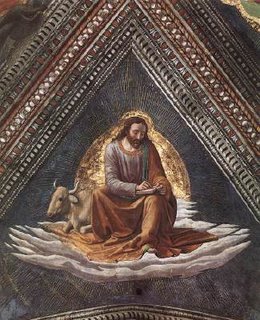 ST LUKE EVANGELIST
Luke was born in Antioch to pagan Greek parents. St. Paul met him at Troas and invited him to accompany him into Macedonia where they traveled first to Samothrace, Neapolis, and finally Philippi about the year 51. Later, he became the constant companion of St. Paul, following him everywhere. He alone remained with Paul when he was imprisoned in Rome about the year 61. After St. Paul's death, St. Luke left Rome. There are conflicting reports about where he went. Some say he preached in Greece, others in Gaul. He wrote his Gospel with the aim of attracting the Gentiles to the goodness and mercy of the Lord. A little later he wrote the Acts of the Apostles. He died without shedding his blood, but the Church honored him with the title of martyr for the long sufferings and mortifications he endured for the cause of the Gospel.
ST LUKE EVANGELIST
Luke was born in Antioch to pagan Greek parents. St. Paul met him at Troas and invited him to accompany him into Macedonia where they traveled first to Samothrace, Neapolis, and finally Philippi about the year 51. Later, he became the constant companion of St. Paul, following him everywhere. He alone remained with Paul when he was imprisoned in Rome about the year 61. After St. Paul's death, St. Luke left Rome. There are conflicting reports about where he went. Some say he preached in Greece, others in Gaul. He wrote his Gospel with the aim of attracting the Gentiles to the goodness and mercy of the Lord. A little later he wrote the Acts of the Apostles. He died without shedding his blood, but the Church honored him with the title of martyr for the long sufferings and mortifications he endured for the cause of the Gospel.
Joy in temporal goods. How a person should direct it to God.
1. We listed the first kind of goods as temporal.[1] By temporal goods we mean: riches, status, positions, and other things claiming prestige; and children, relatives, marriages, and so on. All these are possible objects of joy for the will. But the vanity of rejoicing over riches, titles, status, positions, and other similar goods after which people usually strive is clear. If people were better servants of God by being richer, they would be obliged to rejoice in riches. But riches are rather the occasion of their offending God, as the Wise Man teaches: Son, if you be rich you shall not be free from sin [Ecclus. 11:10]. Though it is true that temporal goods of themselves are not necessarily the cause of sin, yet, because of the weakness of its tendencies, the human heart usually becomes attached to them and fails God, which is sin. Thus the Wise Man says you will not be free from sin. This is why the Lord in the Gospel calls them thorns; the one who willfully handles them will be wounded with some sin [Mt. 13:22; Lk. 8:14]. In St. Luke's Gospel the exclamation – which ought to be greatly feared - asserts: How difficult will it be for those who have riches to enter the kingdom of heaven (those who have joy in them), and demonstrates clearly a person's obligation not to rejoice in riches, since one is thereby exposed to so much danger [Lk. 18:24; Mt. 19:23]. In order to turn us from this danger, David also taught: If riches abound, do not set your heart on them [Ps. 62:10]. St John of the Cross, ‘Ascent of Mt Carmel’, Book 3. Ch 18.
The picture of St Luke the Evangelist is from fresco in Cappella Tornabuoni, Santa Maria Novella, Florence, 1486-90




























